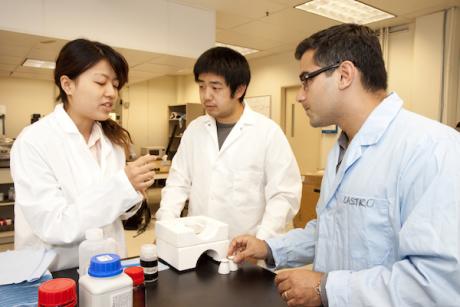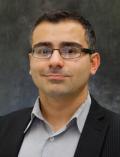Ricardo Castro Earns CALCON 2015 James J. Christensen Award
UC Davis ADVANCE Policy and Practices Review Initiative Committee Member, Associate Professor of Chemical Engineering & Material Science
Congratulations to Ricardo Castro for winning the the North American Calorimetry Conference (CALCON) 2015 James J. Christensen Award! Ricardo Castro is an associate professor in the UC Davis Department of Chemical Engineering and Materials Science.
The award includes an honorarium of $1,000. The awards committee also will provide Castro with complimentary registration for the 70th International CALCON, taking place July 12-16 in Baltimore, Maryland. As an award recipient, he’ll deliver a keynote lecture.
The Christensen Award was established in 1988, to honor Brigham Young University’s Prof. James J. Christensen (1931-87). The award is presented to a scientist who has made outstanding innovative contributions to the development and use of calorimetric instrumentation: the science of measuring the heat developed during a mechanical, electrical or chemical reaction, and of calculating the heat capacity of materials.
Castro joined the UC Davis College of Engineering faculty in March 2009, after earning his doctorate in metallurgical and materials engineering at Brazil’s University of Sao Paulo. He quickly caught the attention of the U.S. Department of Energy’s Office of Science, which in 2011 gave Castro an Early Career Research Program Award.
In the spring of 2014, he received the American Ceramic Society’s (ACerS) Robert L. Coble Award for Young Scholars, an honor named for the ceramics pioneer who devoted his professional career to enhancing the achievement and advancement of young ceramic scientists. In November, Castro also received the 2015 Global Young Investigator Award, presented by the ACerS Engineering Ceramics Division.
Castro’s research centers on the thermodynamic understanding of nanoceramics, and in establishing correlations with processing, stability of the nanoscale, and application. He’s particularly interested in the behavior of nanoceramics in extreme environments, such as high temperatures and nuclear radiation. He attempts to predict such behavior, and then “tune” the environments to induce specific thermodynamic conditions that shift the nano-behavior. His research group has developed unique calorimetric strategies to measure interface energetics, enabling an ever-expanding understanding of nano-phenomena.
Since its inception in 1945, the North American Calorimetry Conference has served as the premier collegial forum for the dissemination of current research and state-of-the-art technological developments in calorimetry and thermodynamics. CALCON participants represent a broad cross-section of scientists in academia, government and industry, whose research interests span a diverse range of disciplines within the fields of biology, chemistry, physics, engineering and emerging frontiers at the interface of core technologies.





